Let’s Play: Ancient Greek Punishment: UI Edition Press Kit
Play Let’s Play: Ancient Greek Punishment: UI Edition
The basics
- Developer: Pippin Barr
- Release: 13 February 2019
- Platform: Browser (mobile friendly!)
- Code repository: https://github.com/pippinbarr/lets-play-ancient-greek-punishment-ui-edition
- Price: $0.00
Who is this Pippin Barr guy?
Pippin is an experimental game developer who has made games about everything from Eurovision to performance art to dystopian post-work futures. He’s an Assistant Professor in the Department of Design and Computation Arts at Concordia University in Montréal. He is also the associate director of the Technoculture, Art, and Games (TAG) Research Centre, which is part of the Milieux Institute for Arts, Culture, and Technology.
Description
Sliders! Radio buttons! Dialog boxes! Menus! Progress bars! These are the instruments of our eternal contemporary torment! The ancient Greek gods would have approved! We are all Sisyphus now!
Let’s Play: Ancient Greek Punishment: UI Edition is another edition in the Let’s Play: Ancient Greek Punishment series begun in 2011 and comprising: Let’s Play: Ancient Greek Punishment (2011), Let’s Play: Ancient Greek Punishment: Art Edition Edition (2015), Let’s Play: Ancient Greek Punishment: Limited Edition (2016), Let’s Play: Ancient Greek Punishment: CPU Edition (2017), Let’s Play: Ancient Greek Punishment: Inversion Edition (2019). In the UI Edition the mythological punishments are reimagined as a series of conventional user-interfaces not unlike Windows 95 control panels and setup wizards. The user/player experiences the same conceptual torments, from an eagle pecking out their liver as Prometheus to an unwinnable footrace as Zeno, but represented in the familiar language of sliders, radio buttons, drop-down menus, and more. The game asks us to what extent many of our interactions with our day to day interfaces can feel Sisyphean, and whether that’s actually strangely comforting. Perhaps we must imagine UI Sisyphus happy?
History
The UI Edition of the series was prompted when I assigned my introductory programming students the project to engage with the myth of Sisyphus using jQuery and jQuery UI, two highly conventional web technologies that are chiefly intended to make attractive and efficient interfaces on the web. While thinking about how I would approach the project myself I landed on the idea of a slider that would perpetually slide back down to 0 each time you set it, preventing you from ever actually escaping its dialog box. With that in mind, I decided to see if I could find UI correspondences for all the mythological torments I’ve included in this series since 2011. It has been a generative process and I’m fairly pleased with where I got to with a couple of them especially (Zeno is a favourite).
Let’s Play: Ancient Greek Punishment: UI Edition is also a continuation of my project to apply the game development documentation approach I’ve been working on with my colleagues Rilla Khaled and Jonathan Lessard. We’ve come to call this approach the MDMA (for me it stands for Method for Design Materialisation and Analysis) and it forms a fundamental part of our Games as Research project. By making a small and nicely self-contained project, I figured it would be a good way to demonstrate the documentation process. So, if you want to, you can read a lot about the game’s development by reading its process documentation and by going through its commit history.
Technology
Let’s Play: Ancient Greek Punishment: UI Edition was created in JavaScript using jQuery and jQuery UI.
Let’s Play: Ancient Greek Punishment: UI Edition is an open source game licensed under a Creative Commons Attribution-NonCommercial 3.0 Unported License. You can obtain the source code from its code repository on GitHub.
Features
- A slider!
- Radio buttons!
- A selection menu!
- A progress bar!
- Dialog boxes!
- A wizard! (But not the exciting kind!)
- Torment!
Trailer
See animated GIFs below, really.
Images
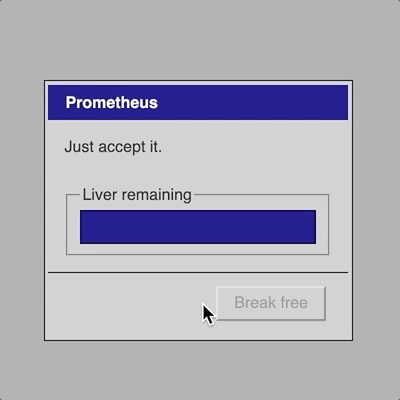
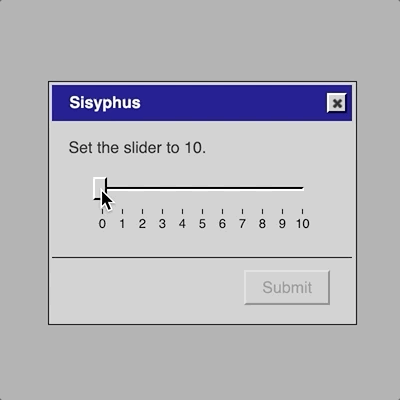
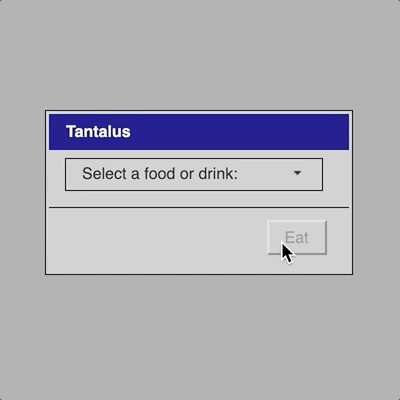
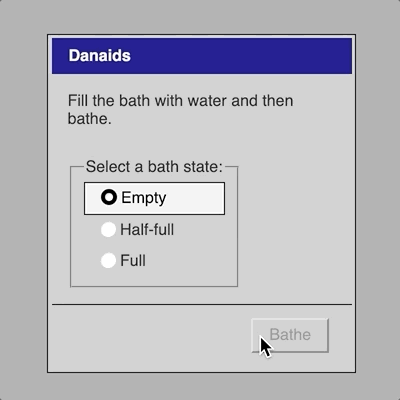
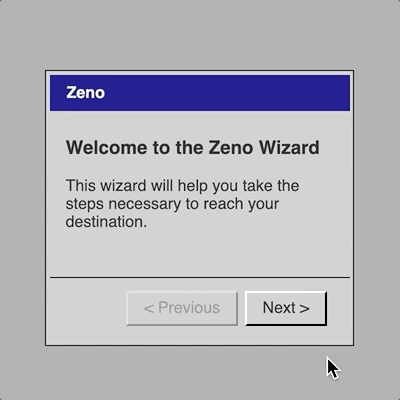
Additional Links
- Closing Statement for Let’s Play: Ancient Greek Punishment: UI Edition
- Process documentation of Let’s Play: Ancient Greek Punishment: UI Edition
- Commit history of Let’s Play: Ancient Greek Punishment: UI Edition
- Let’s Play: Ancient Greek Punishment (2011)
- Let’s Play: Ancient Greek Punishment: Art Edition Edition (2015)
- Let’s Play: Ancient Greek Punishment: Limited Edition (2016)
- Let’s Play: Ancient Greek Punishment: CPU Edition (2017)
- Let’s Play: Ancient Greek Punishment: Inversion Edition (2019)
Credits
- Pippin Barr: everything?
Contact
- Email: pippin.barr+press@gmail.com
- Website: www.pippinbarr.com
- Twitter: @pippinbarr
- Instagram: @pippinbarr
- Facebook: Pippin Barr